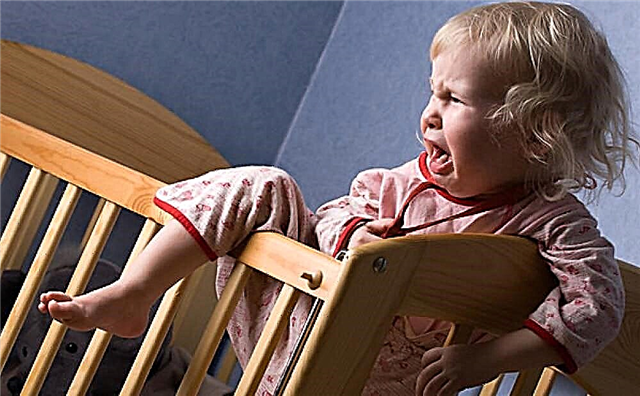Small children in a dream not only rest, but also grow. A good baby's sleep is a sign of health and full development. But what if a child of 9 months does not sleep well at night, often wakes up and tosses and turns? Is this an alarming symptom or a reason to reconsider the attitude of the whole family to sleep?

Sleep disturbance
Sleep rate in nine month old babies
On average, the total sleep time for an infant who is 9 months old is 14-15 hours. The night period takes 10 hours, the remaining 4-5 hours are divided into daily sleep intervals. Usually this time is from 9.00 to 11.00 and from 14.00 to 16.30. This is what the ideal situation looks like.
In practice, various variations of this mode are often encountered. Sleep at night may be shorter; daytime rest may be shorter and more frequent. It all depends on the well-being, health, mood of the child, as well as the lifestyle of the whole family. Trips to the store, walks in the fresh air make their own adjustments to such "ideal" schedules. From an overabundance of emotions, problems begin: the inability to fall asleep, the child begins to twitch, shudder, may wake up and even get up in the crib, pulling himself up in his arms. In general, this is part of the norm, as sleep phases change. It happens that a light stroking or a quiet whisper calms the baby, and he again falls asleep calmly.
But what to do in a situation when a child at 9 months old often wakes up at night? Is this a normal occurrence, or is it a cause for concern and is it time to take action? First of all, you need to understand why sleep becomes restless and the child begins to cry.

Sleep rates of babies
Possible causes of the disorder
The causes of restless sleep at night are most often associated with a violation of the regime and increased emotional activity during the day. These include the following factors:
- Overwork - inquisitive 9 month old babies spend a lot of energy on learning about the world around them, so by the end of the day they have very little strength; but a lot of stress hormone is produced, which interferes with sleep;
- Increased excitability - a physiological feature of the nervous system of young children consists in vivid emotional experiences of the events of the past day. This most often refers to new, unusual experiences for a child: a late visit by guests or a trip to a shopping center. Constant experience prevents the baby from relaxing and falling asleep;
- Wrong daily routine - by the ninth month, a certain daily routine is usually formed that is convenient for all family members. It includes feeding, walking, hygiene, play, activity, and sleep. When a failure occurs in the usual rhythm, babies have a feeling of insecurity, insecurity. Hence the difficulty with falling asleep;
- Long day rest - there are situations when the baby fell asleep while walking in the stroller, and his mother did not wake him up so as not to disturb him. On the one hand, she will have time to do household chores, but, on the other, there is a problem of how to put the child to bed at night;
- Excess energy - if during the day the parents did not find time for a walk, massage or other active activities, then the energy accumulated by the child during the day will find a way out in the evening, when it’s time to go to bed;
- Lack of sleep hygiene and falling asleep ritual - spiky pajamas, uncomfortable pillow or heat in the room do not promote healthy sleep; without a bedtime story or a lullaby, babies often refuse to sleep - it is vital for them to observe certain rituals;
- Improper care - not enough nourishing last feeding before bedtime, dirty diaper, unnecessary and distracting toys in the crib, and the baby cannot fall asleep;
- Parents' nervous tension - when the atmosphere in the family is oppressive, there is a quarrel in the air, the parents sorted out their difficult relationships in the presence of the child, such actions have a very negative effect on his sleep, as well as the general psychophysical state;
- Health problems - teeth are being cut, stomach hurts, or snot is flowing like a stream. Not only the baby, but the whole family is awake.

Emotional overload is one reason for restless sleep.
How to put a baby to bed at 9 months
Every childhood has specific sleep patterns. At 9 months, it is already possible and necessary to organize independent falling asleep, without reference to feeding. The baby can refuse night feedings, is able to survive separation from his mother at night, so joint sleep, if he practiced, can be stopped.
For children older than 3 months, there is a certain interval of increased production of melatonin or "sleep hormone". At nine months, it is synthesized from 18.30 to 20.30. It is during this interval that the baby falls asleep most easily without assistance due to the high concentration of the hormone. It allows muscles to relax, and metabolic processes slow down. This is how a state of sleepiness arises.
Important! One of the rules of healthy children's sleep of Dr. Komarovsky is: "prioritize." No need for a child's sleep at the cost of a parent's sleepless night. The main task is that all family members should be able to sleep.
Pediatricians at this age advise to teach the baby to fall asleep on their own: put in a crib and go out for 10-15 minutes. If he starts to cry, sit down or even get up in the crib, return to the room and calm down with words, say good night. The main thing is not to take them out of the crib, calm them down and put them back in the crib. The process of going to bed can be delayed, but this method really works if you gradually increase the intervals between laying down and returning to the room. Usually, on the 3-4th day, results already appear, and the baby acquires the skill of falling asleep on his own.

Gradually, the baby will learn to fall asleep on its own
Sleep advice for parents
If a nine-month-old baby has problems with sleep that are not related to illness, parents will be able to cope with them on their own. First of all, you need to be patient - this problem cannot be solved in one day. Temporary failures should not be frustrating; a positive attitude is essential for success.
First of all, it is necessary to provide comfortable conditions for a healthy rest:
- ventilated room with an air temperature of 20-22 degrees;
- humid air, parameters of relative humidity in the room - 60-70%
Such indicators will be comfortable not only for the child, but also for the whole family. It is to them that you need to strive.
Next, you should organize a comfortable sleeping place and choose clothes:
- baby cot with orthopedic mattress;
- a pillow is not required if there is no medical indication for this;
- a blanket and bedding made of natural breathable materials;
- comfortable cotton clothes - a blouse and pants without strings and bulky details or a special overalls for sleeping (slip).
Properly organized leisure activities during the day:
- balance between active and calm games;
- walks in the open air;
- timely daytime sleep lasting 4-5 hours in total per day;
- before going to bed (2-3 hours in advance), exclude outdoor games, watching cartoons;
- do not receive guests in the evening.
A very important point is the last feeding. For babies on gv or mixed feeding, this must necessarily be breast milk, in a position convenient for the child and mother, after a light massage, bathing and hygiene procedures. If the night feedings have not stopped, then at night, too, eat breast milk.
Important! Provide your baby with a quality diaper at night. Throughout the day - preferably, at night - a must.
Introduce bedtime rituals:
- go to bed at the same time every day;
- bathing before going to bed, then hygiene procedures;
- after feeding, sing a lullaby or read your favorite fairy tale.

Nightly ritual - reading at night
The most important thing in a daily ritual is its immutability. Whatever happens, it must be realized. We must not forget about bathing, the exception is illness. It is impossible not to read a fairy tale, as an alternative, you can use audio fairy tales or read in advance on a dictaphone. Still, the native voice will calm the baby more. It is the constancy of such rituals, which can be individual in every family, that bring predictability and safety to a child's life.
When you need a doctor
Unfortunately, sleep problems can be caused by more serious reasons than poor regimen or long naps. The following situations require immediate medical attention:
- head thrown back is a symptom of increased intracranial pressure;
- frequent involuntary tremors of the limbs - a symptom of a lack of calcium and vitamin D in the body; together with excessive sweating, it can be a symptom of rickets;
- ajar eyes - an overload of the nervous system and increased excitability;
- nightmares, accompanied by trembling of hands and feet and a frozen gaze.

Woke up in the middle of the night after a nightmare
Teething pain or stomach cramps are not urgently needed, but a specialist consultation is helpful. To relieve gum pain, pain relief gels and ointments with a cooling effect are commonly recommended. To relieve stomach cramps, there are also medications that the doctor prescribes at the reception.
Sleep disturbance is most often caused by a new stage of growing up of a baby and the development of physical activity. Care and patient teaching of healthy sleep by the parents will help the child to fully develop and grow not only during the day, but also during sleep.



